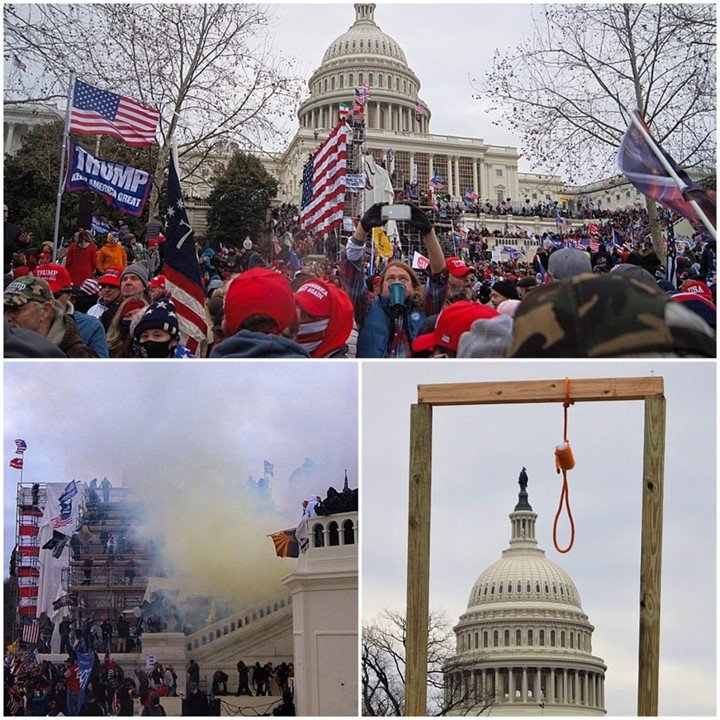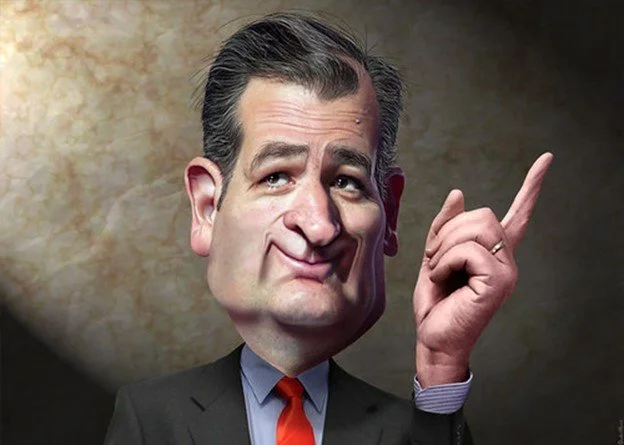Smoke and Mirrors: Reading the Rhetoric of Ted Cruz
By Lillian Robles, UCLA
It is well-known that on January 6, 2021, while the electoral votes were being certified, an insurrection was unfolding at the U.S. Capitol. The event was born of a concerted effort to overturn the results of the presidential election. Probably the most important aspect of this event was the barrage of misinformation doubting the security and results of the election. So, to understand this piece of history that is still unfolding, it is important to understand the rhetoric, or the verbal tactics, attached to it. In other words, how can a lie about election fraud be crafted so effectively? In his speech on that day, Senator Ted Cruz objected to the counting of electoral votes, which is largely ceremonial, on the grounds that many Americans believe that there was widespread voter fraud and/or a rigged election. As the counting of the votes is largely ceremonial, the result of the election was already well-known and official. It was highly unusual that this event was made newsworthy, and only the widespread misinformation made the routine counting procedure a point of contestation. Note this idea; it is a matter of people’s standpoints. This paper will examine Cruz’s senate speech raising an objection to the certification of electoral votes through two theoretical lenses: first, Niklas Luhmann’s systems theory and, supplementally, Sara Ahmed’s cultural politics of emotion. Together, these lenses, along with an op-ed on the subject published in the New York Times, demonstrate the ways in which Cruz obfuscates his own role in the situation as a rhetorical tactic of not only persuasion but political self-preservation.
"Ted Cruz - Caricature" by DonkeyHotey is marked with CC BY-SA 2.0.
"Smoke and mirrors" by theilr is marked with CC BY-SA 2.0.
First, this paper will examine Luhmann’s systems theory for the purpose of a theoretical framework for understanding Cruz’s rhetoric. Luhmann can be employed here because his work offers a useful lens that contends with the problem of perspectives: the ways that individual points of view prove inescapable in communication, rendering truth and clarity elusive at best. Luhmann was a sociologist and key thinker of the 20th century. Ultimately, the problems presented by Cruz’s rhetoric are problems of perspective. Luhmann’s work hinges on observation. Put simply, first-order observation is when an observer distinguishes the observed from everything else. Second-order observation is the same, except the observee is another observer, who is, in turn, observing. As Luhmann writes,“On the level of second-order observation, one can thus see everything: what the observed observer sees, and what the observed observer does not see.”[1] So, in this quotation, the second-order observer is able to analyze critically the first-order observer’s act of observation. Again, the first-order observer (and their act of observing) is being observed. Looking closely at Luhmann’s words, this passage is distinctly difficult to read, for all the repetition. It gives the sense that there are endless frames to be employed-- that is, endless different ways to observe. The constant generation of frames makes it possible to get lost in them or, if you are Cruz, to hide yourself in them. Indeed, Cruz is more interested in the variety of ways that the situation is seen, than how the situation is in reality,“All of us are faced with two choices, both of which are lousy. One choice is to vote against the objection, and tens of millions of Americans will see a vote against the objection as a statement that voter fraud does not matter, is not real, and should not be taken seriously. And a great many of us do not believe that.”[2] Cruz’s issue does not seem to be the reality of election fraud, or a lack of election fraud, but that there are multiple perspectives on the matter, and he does not want to situate himself in one. Instead, he hides himself in the multitude. A frame is a particular way of looking at something. It is the perspective: what an observer sees, what they ignore, what they do not know. Furthermore, there is necessarily a blind spot in the process of observing. That is, each observation carries with it a specific frame that misses something. The second-order observer can see another observer’s blind spot, though not their own. So, a second-order observer can examine the shortcomings of another observation.
Now, put Cruz’s speech in the context of second-order observation. It illustrates how Cruz’s speech splits into different observers with different frames, and how he uses this to his advantage. Ostensibly, Cruz is speaking in response to supposed election fraud. Regarding this, his speech is first-order observation. It also may be said that Cruz is observing what others think and observe about supposed election fraud, trying to capitalize on it, and is a second-order observer. Cruz assesses the situation as follows,“I understand your concerns, but I urge you to pause and think, what does it say to the nearly half the country that believes this election was rigged if we vote? Not even to consider the claims of illegality and fraud in this election.”[3] In this passage, Cruz is more concerned with how other people view the legitimacy election, than how he views the election. This is, according to Luhmann, second-order observation. These categories by no means follow hard-and-fast rules. They are merely different frames that Cruz likely deploys when they fit a goal. For example, Mimi Swartz, contributor to the New York Times, is a second-order observer: Swartz observes Cruz’s observations. The idea, then, is that Swartz is pointing out Cruz’s blind spots. She points to Cruz’s position as a second-order observer: an observer observing his own observation. Swartz writes: “Any decent soul might ask: If you are so smart, how come you are using that fancy education to subvert the Constitution you have long purported to love? Shouldn’t you have known better? But, of course, Mr. Cruz did know better; he just didn’t care.”[4] This is how I divide Cruz into two separate observers: Cruz, the first-order observer, who believes it is important to investigate alleged election fraud, and Cruz the second-order observer who sees himself, knows what he is doing, knows he is wrong, and does not care. In other words, the first-order observer is on the ground, in the action, while the second observer is more bird’s eye view. This is not to suggest that Cruz has some sort of split psychology, but to provide a theoretical framework fit for describing Cruz’s deception. Another second-order observer Cruz is or might act as (or another frame he might employ) is the one who tries to calculate whether this move will be good or bad for his career. The different versions of Cruz make it difficult to find a “true” observation being made. Or perhaps the “true” intention. There probably is not just one. Each of these different observations, each different frame, has a different perspective with different aims. This serves to obscure any true intention, which gives Cruz strong cover.
Next, supplement the analysis of Cruz’s speech through the second theorist: Sara Ahmed and her book, The Cultural Politics of Emotion, which explores how emotions shape individual identity, group identity, and hierarchical power. Although Luhmann provides the central analytical framework used here, Ahmed’s work provides a specific example of a set of perspectives, or frames, that Cruz hides in: emotion. In this text, emotion becomes a sort of rhetoric: an apparent lack of emotion becomes a sign of intelligence,“It is not difficult to see how emotions are bound up with the securing of social hierarchy: emotions become attributes of bodies as a way of transforming what is ‘lower’ or ‘higher’ into bodily traits.”[5] This distinction is one that Cruz sees, uses, and leverages. Indeed, Cruz specifically distances himself from any sort of emotionality.
“Mr. President, we gather together at a moment of great division, at a moment of great passion. We have seen and, no doubt, will continue to see a great deal of moralizing from both sides of the aisle, but I would urge to both sides perhaps a bit less certitude and a bit more recognition that we are gathered at a time when democracy is in crisis.”[6]
By Aca1291 - Own work, CC BY-SA 4.0, https://commons.wikimedia.org/w/index.php?curid=114522093
Cruz uses rhetoric of unfeeling logic. By acknowledging that there is passion, but positioning himself outside of it, Cruz seeks to inhabit the supposed higher plane of which Ahmed speaks. Cruz denigrates “moralizing on both sides,” seeming to intimate that, while others’ arguments are based on emotion, his is based on logic. However, Cruz’s coldness is not a true lack of emotion. Ahmed writes: “Hardness is not the absence of emotion, but a different emotional orientation towards others.”[7] So, Cruz’s speech should not be read as unemotional, nor should a lack of perceived emotion be a sign of superiority. Swartz points out that this simply is untrue: “Mr. Cruz has been able to use his pseudo-intellectualism and his Ivy League pedigree as a cudgel.”[8] Cruz’s intellectualism, or perceived intellectualism, is nothing more than a weapon to be deployed or not. In fact, it is another frame: a way he presents himself to impact the ways that others see him. It is a frame Cruz can hide in.
Cruz’s emotionality becomes more complex, as he does not manage to remain outside of it entirely. Already, Ahmed has made clear that lack of emotion is an emotional orientation. It is a notion that is complicated further here,“You may not agree with that assessment, but it is, nonetheless, a reality for nearly half the country.”[9] Here, Cruz is referring to the belief that there was widespread election fraud. Cruz continues to pose as the unemotional intellectual, simply trying to do the right thing. He uses the word “agree” in addressing his opposition (that is, people not trying to subvert the election results). The word “agree” makes it seem as though it is an opinion that is subject to emotion, not reason. Then, he uses the word “reality” to describe those who believe that the election was fraudulent. To return to Ahmed: “So emotions are not simply something ‘I’ or ‘we’ have. Rather, it is through emotions, or how we respond to objects and others, that surfaces and boundaries are made: the ‘I’ and the ‘we’ are shaped by, and even take the shape of, contact with others.”[10] In other words, emotions form individual or group identity. Emotions draw the boundaries between interiority and exteriority. So, what is Cruz doing here? Cruz is drawing lines. First, there is a “you all” created for the other side, formed by how that side “does not agree.” That line also defines the side of believing the election was fraudulent. While Cruz gives them the rhetorical upper hand, that coldness is still emotion, so this side, too, is defined by emotion. Cruz is careful in his speech to appear on the side of finding the truth, not any of the two sides. Thus, Cruz elevates the idea that there was fraud, furthering his agenda, while distancing himself and preserving his own reputation.
Next, Cruz’s relationship to the two sides may be expanded upon by returning to Luhmann. These are more ways in which Cruz hides himself in his rhetoric, specifically, the position of the grammatical subject. Luhmann writes,“The ‘self’ of the system can appear and disappear as suggested by circumstances. Language may make the speaker more visible if it is required to say ‘I love’ and not simply ‘amo.’”[11] Luhmann points out that language (here acting as a frame), positions the speaker, or the subject prominently and inconspicuously. From this, how Cruz hides himself in his rhetoric becomes apparent. Cruz in his speech says,“So I endeavored to look for door No. 3, a third option, and for that I looked to history, to the precedent of the 1876 election, the Hayes-Tilden election, where this Congress appointed an electoral commission to examine claims of voter fraud.”[12] Here, Cruz speaks of two options: ignoring complaints of fraud or discounting the election due to them. Thus far, Cruz has brought himself out, away from partisan fighting to seem rational rather than emotional. In one sense, he draws extra attention to himself,“I endeavored” emphasizes his individual action in being the champion of justice and truth. However, there is another level in which he draws himself away from those who believe that there was voter fraud. When discussing the “two sides,” Cruz recedes into the background. Thus, he manages to endorse the course of action entirely while separating himself from conspiracy theorists and seditionists.
Finally, there is Luhmann’s notion of paradox and how Cruz’s speech traps the listener in its apparent common sense. Luhmann discusses paradox, for our purposes, as something which is and is not, true and not true at the same time. It is often used to expose fault in common sense. Luhmann argues that one must “deframe” common sense (take it out of its context) and reframe it (put it into a new one). Luhmann writes the following: “The communication of paradoxes fixes attention on the frames of common sense, frames that normally go unattended. If this is the function, then it will not surprise us that deframing again needs its own frames.”[13] Luhmann’s points play out in Cruz’s speech,“Astonish the viewers and act in a bipartisan sense to say we will have a credible and fair tribunal, consider the claims, consider the facts, consider the evidence, and make a conclusive determination whether and to what extent this election complied with the Constitution and with Federal law.”[14] The idea of a paradox is to “deframe” common sense. The language in the above quotation is precisely what everybody is supposed to want: bipartisan cooperation, fairness, and objectivity. It may be common sense to double- and triple-check the legitimacy of an election so important. That is, it may be common sense if taken wildly out of context, which Cruz does expertly. As in this passage, he plays the voice of reason, when his actions would have the impact of undermining the results of an election,“And what I would urge of this body is that we do the same. That we have pointed electoral commission to conduct a 10-day emergency audit, consider the evidence, and resolve the claims.”[15] In another sense, the idea that, here, a bipartisan investigation into possible election fraud is a bad thing (which it certainly is) creates a sort of paradox. Cruz makes it a paradox by framing his proposal as a good thing. It must be deframed by removing Cruz’s frame and adding a new one, the actual context. In more practical terms, what Cruz does constitutes what Luhmann defines as a paradox because it uses the wrong frame for the situation, though it deploys common sense, so it seems like the right frame, the right perspective. The different observers that constitute Cruz in this moment employ these different frames that help to understand the paradox. A paradox is a matter of frames, and so is Cruz’s performance. Using one frame he is doing something horrible, in another it is something patriotic. In one, he is completely without emotion and in another as Ahmed writes, the situation is entirely emotional. The multitude of possible frames can make it difficult to track down and pinpoint the truth. Cruz exploits the fact that the frames are endless to make the situation work for him. In the case of paradox, as Luhmann writes, to create a paradox is to necessitate constant deframing and reframing, which is the perfect way to shirk the truth in favor of abundant misdirection.
What is not clear is if Cruz thought this speech had any chance of overturning the result of the election, or if he just thought it a good career move. Unfortunately, the intention is impossible to know. All that can be known are the consequences The speech specifically places any semblance of objectivity, or possibility of accountability for Cruz into doubt. This is not to say that one cannot know what happened, or who is at fault, as that part is clear. However, Cruz’s speech becomes a case-study for how to employ smoke and mirrors and how to use rhetoric to obfuscate your own actions.
Ted Cruz Senate Speech on Election Certification Transcript January 6 | Rev
https://youtu.be/kN4yljm6y5U
Endnotes
[1] Niklass Luhmann and William Rasch. Theories of Distinction: Redescribing the Descriptions of
Modernity. (Stanford: Stanford University Press, 1st ed., 2002), 115.
[2] Ted Cruz. 117th Congress, 1st session, report 167, p. 3. 2021.
[3] Cruz, 3.
[4] Mimi Swartz. “Never Forget What Ted Cruz Did.” New York Times (New York, NY, Jan. 13, 2021).
[5] Sarah Ahmed. The Cultural Politics of Emotion. (New York: Routledge, 2nd ed. 2014), 3.
[6] Cruz, 3.
[7] Ahmed, 4.
[8] Swartz.
[9] Cruz, 3.
[10] Ahmed, 10.
[11] Luhmann, Rasch, 86.
[12] Cruz, 3.
[13] Luhmann, Rasch, 81.
[14] Cruz, 3.
[15] Cruz, 3.




